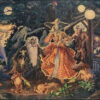Nyabinghi
Written by: Britney Walters
“A seh these are some serious times, all I can see around us is just violence and crime. Full time for us to centralize, socialize and realize, let the sun shine throughout everyday”. – Serious Times by Gyptian was released in 2006. It is one of the most popular Nyabinghi songs known today by people of all ages. It is said that Nyabinghi’s rhythmic melody soothes one’s emotions, thus allowing them to fall into deep meditation. Nyabinghi songs are often times a reflection or tribute to society or a higher being “Selassie/The king”
“It Na take nothing at all fi hail the king, him bless me in a what me doing, it na take nothing at all fi hail the king, Selassie the king of all king” – Fantan Mojah
Nyabinghi is a significant Rastafarian practice which shares factors relating to matters of the heart; this may include purity, love and wholesomeness. Nyabinghi is derived from a religious and political movement led by spiritual women in East Africa. “A people without the knowledge of their past history, origin and culture is like a tree without roots”- Marcus Garvey, JR.
The word Nyabinghi was formerly linked to the African warrior Queen Muhumuza (also spelled Muhumusa) and the fight against European colonialism in East Africa. It was a fight to regain independence. The Nyabinghi religion, however, was in existence long before the birth of Muhumuza. In the 1700’s a Queen named Nyabinghi was killed by her husband in hopes of attaining her kingdom. Queen Nyabinghi spirit tormented the kingdom years after her death. This resulted to villagers establishing a Nyabinghi cult in order to remain in existence, especially through the lives of women. One of these women was Muhumuza; through her the practice became more prevalent and gained popularity. Nyabinghi is the powerful force in humanity that brings together peace, love, justice, compassion and respect.
 Rastafari Bobo Shanti Nyabinghi Church
Rastafari Bobo Shanti Nyabinghi ChurchAs shown in history and present times, love and true justice will always come at a true and painful cost. This expression of love and respect is exhibited throughout Rastafarian lives and ceremonies. Nyabinghi music is played at Rastafarian grounations; these usually include the playing of drums, dancing, chanting, praising and smoking of the spiritual herb, ganja.
The oxford university press states that Nyabinghi means “She who possesses many things” however, it is said that Jamaican refers to Nyabinghi as “death to the black and white oppressors”. During the dreadlock supression Rastafarians would dance Nyabinghi to summon death to oppressors. Nowadays, Nyabinghi is used for celebratory purposes and special occasions. The first Rastafarian Nyabinghi ritual took place in Jamaica in March of 1958. Rastafarians are truly a unique religion by itself; Rasta’s refer to themselves as “I and I” because they believe God is living inside them and that the sounds they create from drums are the voices of God. Nyabinghi is seen as an influential practice as Rasta’s believe in peace and unity. This practice will continue to spread from generations to generations.
Sang by our late Bob Marley “Jump, Jump, Jump, Nyabinghi”
“Jump, Jump, Jump, Nyabinghi”
“Jump, Jump, Jump, Nyabinghi” *2
“We’ve got the herb (got it) *2
“So hand I the surf board because most of all we have not got nothing to lose”
Image courtesy Mary Ann Kennedy BBC Radio World on 3.
Most Popular Posts
Caribbean Folklore With Illustration
By: Lesandra ScottSince it was way too early for bed and with her four teenage children, without any internet and evidently growing restless, Mother decided to use this inopportune moment to tell us tales and stories about entities of the night, the Caribbean folklore that she was told of when growing up as a child.
Read more ...Jab Jab, the mass of the downtrodden, the music of the simple man has now ascended into prominence and respectability on the carnival scene. Jab has been around since the origin of carnival, Jab Molassie in Trinidad and Jab Jab in Grenada.
Read more ...Terri Lyons Is Calypso Royalty
By: Nekisha CyrusHands down, Terri Lyons is one of the most dynamic vocalists in the game with the musical versatility to match. Even though she hails from soca royalty as daughter of a soca legend, the one and only Super Blue, she has been determined to create her own legacy in the music industry
Read more ...Mas Legend, Peter Minshall Returns for Carnival 2020
By: Nekisha CyrusPeter Minshall will be returning to the Trinidad Carnival scene in 2020 as a band mas-designer. No stranger to controversial art, the recent unveiling of his new collection ‘Mas Pieta’ was inspired by Michelangelo’s renaissance sculpture, ‘The Pieta’.
Read more ...



